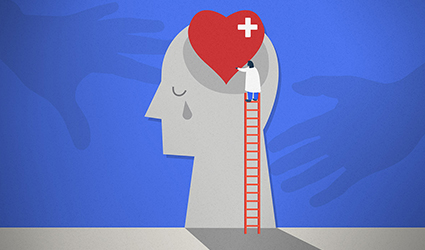Proteins Found to be Crucial in Mood and Behavior Disorders
August 12, 2018
Source: MedicalXpress
 715
715

New evidence has been unearthed by researchers at Columbia University Irving Medical Center (CUIMC) of how specific transport proteins function at the molecular level, creating a pathway for new, improved drugs to treat psychiatric disorders.
The findings of the study, titled "The LeuT-fold neurotransmitter: sodium symporter MhsT has two substrate sites" has been published in the Proceedings of the National Academy of Sciences (PNAS). Neurotransmitters sodium symporters (NSS) control signals between nerve cells, and are also the molecular target of antidepressants (SSRIs like Prozac) and other psychostimulants. The knowledge about their constitution and function, hence, is imperative to the designing of apt therapeutics to treat disorders such as depression, anxiety, and obsessive-compulsive disorder (OCD).
Led by CUIMC researchers Matthias Quick, Ph.D., Associate Professor of Neurobiology (in Psychiatry) at Columbia University Vagelos College of Physicians and Surgeons and Jonathan Javitch, MD, Ph.D., Lieber Professor of Experimental Therapeutics in Psychiatry and Professor of Pharmacology at Columbia University Vagelos College of Physicians and Surgeons, the team's new study evaluated an additional bacterial NSS homolog (MhsT) that is more functionally alike to its human equivalent. Their discovery of a second substrate binding site in this NSS, too, strongly proposes that the identical configuration is expected to be found in human NSS as well, and disregards a great deal of the previous skepticism.
"These data suggest that the involvement of two binding sites in neurotransmitter transport is not unique to LeuT but shared by other NSS members, and is possibly a universal feature of these many transport proteins," says Dr. Javitch.
"Looking forward, incorporating the knowledge from this new discovery into future NSS research could lead to better-informed therapeutics research and design, ultimately improving the lives of the millions of Americans afflicted with psychiatric disorders," says Dr. Quick.
By DduRead more on
- Things to Know before Buying Newborn Baby Incubators March 31, 2022
- Highly Resistant Food Poisoning Bug Responds to Antibiotics September 6, 2018
- Smartphone Based Diagnosis to Identify Mosquitoes Transmitting Infection September 5, 2018
- 3 Natural Plant Extracts Manufacturers on Drugdu.com September 4, 2018
- Shenzhen Chuanggan – Health Assessment Facility Supplier September 4, 2018
your submission has already been received.
OK
Subscribe
Please enter a valid Email address!
Submit
The most relevant industry news & insight will be sent to you every two weeks.



